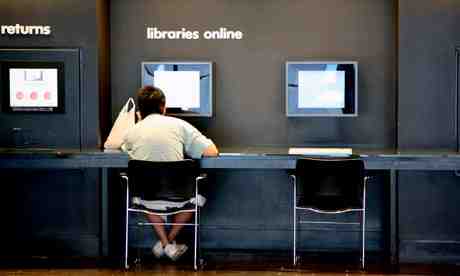
Internet access: ‘with more than 200 public libraries closing last year and skilled staff being replaced by untrained volunteers, even this freely available support has been gradually dismantled.’ Photograph: Jeff Blackler / Rex Features
In September last year, Iain Duncan Smith’s advisers warned him that his bid to simplify the benefits system was “unworkable and unfair”. Alongside concerns that, during a recession, part-time workers would be forced to seek longer hours of employment or risk losing their benefits, there were also serious questions being asked regarding the introduction of the universal credit. Chief among these concerns was the decision to make the system wholly internet-based. This seemed at odds with Duncan Smith’s intentions to help people “escape the benefits trap“.
A glance at the state of internet access in the UK underlines the difficulties that many will face in being able to utilise this system. For example, according to data released by the Office for National Statistics (ONS), 5.2m households are without internet access (20% of all households in Great Britain). While some of those households belong to pensioners, a significant proportion house those of working age who will, therefore, suffer as a result of the proposed changes.
According to the latest Internet Access Quarterly Update published by the ONS, 6.6% of those earning less than £200 per week and 5.5% of those earning between £200-£299 per week had never used the internet. Indeed, it is only when the £700-£799 mark is reached that the figure drops below the 1% mark. When one considers that the north-east of England is the only mainland region with connectivity below 80% and is also the region with the highest unemployment at 9.1% , it’s not hard to see the difficulties that will emerge from a policy of shifting benefit claims online.
However, the actual reasons for a lack of internet access are also crucial. The most recent Internet Access – Households and Individuals report by the ONS reveals that while 54% claim that they simply do not need it, 22% claim a lack of skills, 15% blame equipment costs and 14% access costs. It’s hardly surprising that those at the lower end of the economic scale would cite both a lack of skills and expense as barriers to internet connectivity.
Those without an internet connection will not only find it difficult to claim the benefits they are entitled to, they will also find it difficult to find work, something that this government claims to be addressing through its benefit reforms. A recent survey by ICM underlined the extent of the difficulties facing those lacking internet skills in finding work, revealing that “72% of employers are unlikely to even offer an interview to someone without basic computer and internet skills”. Those without basic skills or the ability to pay for the equipment will be penalised both in terms of benefits and in actually finding work.
The extent of the penalisation of employment prospects through this shift towards digital was underlined in a report by Citizens Advice Scotland (CAS). In their report, CAS claimed to have collected evidence that:
“…showed instances of people being penalised at the Jobcentre for not applying for jobs online. This was even found to have happened when people had applied for jobs in writing or by phone due to their inability to use a computer.”It is unclear how widespread this practice is, or how many people have been affected, but the penalisation of those not online in seeking work is grossly unfair, punishing those without an internet connection for applying for jobs by other, legitimate means. Rather than eliminating the so-called “benefits trap”, this government’s overhaul of the benefits system is in fact creating a trap for thousands of job seekers.
It would help, of course, if the infrastructure was in place to provide support. For many, public libraries with free internet access have been that place. However, with more than 200 public libraries closing last year and skilled staff being replaced by untrained volunteers, even this freely available support has been gradually dismantled. Indeed, in the north-east where connectivity is low and unemployment above the national average, Newcastle city council is planning to close 10 public libraries, resulting in communities losing free internet provision supported by skilled staff.
The economic impact of the digital divide is a serious and very real concern. It seems that Iain Duncan Smith and the Conservative party either do not understand that their plans exclude many thousands or they do not care. Either way, the consequence of these changes to the benefits system is that even if they wanted to escape, many will remain trapped.